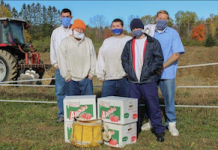
Through the end of March, workers at an Amazon fulfillment center in Bessemer, Alabama are voting on whether or not to join the Retail, Wholesale and Department Store Union. If a majority of the 5,800 Alabama workers vote to unionize, it would be the first such success for organized labor against the notoriously anti-union, multi-national online retail giant. In a recent statement, President Joe Biden defended workers’ rights to form unions, that while not mentioning Amazon, did reference “workers in Alabama.”
At a time when labor unions continue to lose membership, a victory at Amazon would be a real morale booster. In fact, since the voting began in Alabama on Feb. 8, more than 1,000 Amazon workers from across the country have reached out to RWDSU, seeking information about unionizing their own workplaces.
Since the deadly coronavirus spread across the globe, Amazon has posted record profits, opened new warehouses and hired new workers. But Amazon workers have been increasingly critical about lax COVID-19 safety standards and not sharing in the company’s success. Between The Lines’ Scott Harris spoke with Jonathan Rosenblum, an author and community organizer for Seattle City Council member Kshama Sawant. Here, he examines what’s at stake in the Amazon workers’ union organizing drive in Bessemer, Alabama and for American workers.
JONATHAN ROSENBLUM: I think what’s going on in Bessemer is actually workers making history. I would say that the workers have been successful already, no matter what happens in this election. And that’s not to be Pollyannish or minimize the importance of the election results. But just having a struggle of this magnitude and to get this far against a company with such power — political and economic and cultural power — is itself a testament to the workers’ bravery and strength, and their willingness to struggle. And I know will inspire workers at warehouses and other workers throughout Amazon’s global empire to take similar action in the months and years ahead.
SCOTT HARRIS: Thank you for that, Jonathan. In terms of this battle, I think it goes without saying that the eyes of the country are going to be on the result of this election, this union election. What’s at stake for American workers? You know, if there’s a win or a loss for the unions here, obviously this isn’t the end of the union struggle in the country, but certainly it’s a landmark point in time.
JONATHAN ROSENBLUM: Yeah, it is certainly a landmark struggle, but I would say that if the workers don’t win the election, it’s not the end of the struggle. It simply is another waypoint in our generational fight against global monopolies like Amazon. And if the workers win the election, then things get really hard because then they have to force the company to negotiate a contract. And with what we’ve seen in the run-up to this election and what we’ve seen with Amazon’s union resistance throughout the globe, winning that contract is not going to be easy — that ultimately Amazon workers are not going to build power one warehouse, one glass tower at a time. But rather, they have to unite globally, nationally, and then globally to form a powerful union so that Amazon cannot just take out one warehouse that has unionized, exclude it from its system and then keep moving forward in its profit-making machine.
So actually, the first thing that the Bessemer workers need to do if they win the election is figure out how they’re going to go out and organize along with us other warehouses so that they’re not the only ones.
I also want to just note, Scott, we talk about this thing, about a union election. I think it’s just important, especially for your listeners who are not intimately familiar with what a National Labor Relations Board election in a hostile employer environment looks like, it is not an election like we would think about in the normal democratic term of an election where you were, for example, in the presidential election that we just went through, not withstanding problems with the media, at least Joe Biden could get his message out, right? That he could run advertisements. He could get on the airwaves. He could do things so that people knew to vote for him.
In contrast, in the union election the Bessemer workers are going through, Amazon is fighting tooth and nail. There’s absolutely no equivalent to what we see as a democratic election. The workers go into work and they’re bombarded daily with these anti-union messages, text messages. When they go to the bathroom, there’s a flyer in the stall telling them to Vote No. When there’s radio ads, there’s captive audience meetings, the company’s been holding these mandatory meetings where anti-union messages are delivered to workers. And there’s absolutely no sort of equal time provision where pro-union messages get to get up. Absolutely none of that. And I understand that even Amazon has changed the traffic light system outside of its Bessemer warehouse, so that workers no longer have the opportunity to stop and talk to union organizers before and after their shifts.
So this is not really an election in a free and fair environment, but rather this is a vote that’s happening in this sort of scorched earth environment where there’s no pro-union message permitted by the company. And all the anti-union messages are a constant bombardment against the workers. And so, if the workers actually emerge from this battlefield and prevail in an election, it will be fantastic. And if they don’t, well, then we will get back on and climb that mountain again in the coming months and years. But recognize that the current election regime for workers in this country is anything but free and fair.
For more information, visit Jonathan Rosenblum’s website at jonathanrosenblum.org.




